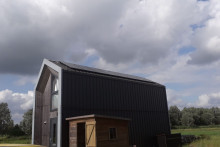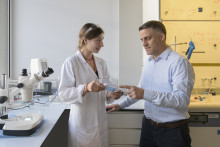Diego F. Quintero Pulido is a PhD student in the Computer Architecture for Embedded Systems group at the UT’s EEMCS faculty. He has done research on off-grid houses, in particular houses that are capable of being electrically self-sustained and depend primarily on renewable sources – which is something he believes can create a better tomorrow.
Not enough vs too much electricity
‘If it comes to electricity, there are two problems in the world,’ says Quintero Pulido. ‘On the one hand in some developing countries, especially Sub-Saharan Africa, there is not sufficient supply of electricity and there is not a proper grid infrastructure. Which is why off-grid houses might be a feasible option to provide access to electricity for everyone. In developed countries, on the other hand, we produce and consume too much electricity which causes an imbalance in the electricity grid. In terms of peaks, the grid can’t handle it anymore. Off-grid houses and buildings could be disconnected from the grid when needed and they could avoid these peaks.’
Backup
Within his PhD research, Quintero Pulido has looked into new storage technologies that could help power such self-sustained houses. Using test houses - one in the US and one in the Netherlands – and computer simulations, he investigated the most feasible ways of powering an off-grid building. He found that if a house would rely only on solar energy and batteries, ‘you’d need a large generator and a very big battery’ to power the house all year round. ‘However, if you add a backup unit, the picture improves,’ says the researcher.
Using waste as fuel
Quintero Pulido suggests to use Glycerol Fuel Cell as the backup power. ‘This is a very environmentally friendly solution,’ he says. ‘Because glycerol is a waste product produced as a sub-product of Biodiesel and any esterification process. We have a lot of it, but we don’t have many applications for it. I studied if it’s feasible to use it as fuel in an electrochemical cell. Now I focused on the chemistry behind it and in the future I’d like to try to develop such a fuel cell further.’
Implementing the knowledge
The knowledge produced by this doctoral research is already being applied in practice. Quintero Pulido is involved in European project De Coobraa, aiming to produce off-grid houses in the Netherlands. ‘Off-grid houses with the setup I proposed are not created yet, but in Coobra we are trying to implement my research. I’m hoping to find a postdoc position so I can continue my work in this field.’

Diego F. Quintero Pulido







